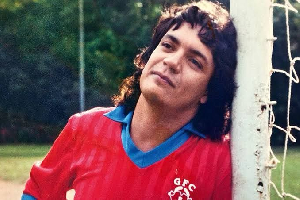Carlos ‘Kaiser’ Henrique: The story of the man who faked his football career

Meet Carlos Henrique Raposo, infamously known as ‘Kaiser’. He’s the ultimate football enigma – a man who achieved legendary status without ever stepping foot on a professional pitch.
Through a web of clever lies and manipulative charm, Kaiser orchestrated the greatest football hoax of all time, earning a twisted sort of admiration for his sheer audacity.
Born on April 2, 1963, in Rio de Janeiro, Brazil, Kaiser, grew up with a passion for football that rivaled his humble beginnings.
As a young boy, he played on the streets, honing his skills until he caught the attention of Flamengo, where he spent seven years developing his game.
However, by age 16, it became clear that Kaiser wouldn’t make the cut at Flamengo. He was released, but his football dreams didn’t die.
At this crossroads, Kaiser faced a choice: put in the gruelling work required to succeed in football or abandon his dreams.
But Kaiser had other plans. He was determined to live the luxurious lifestyle of a football star without putting in the effort.
With his athletic build and charming personality, Kaiser’s life took a dramatic turn when he was mistaken for Renato Gaucho, the star player of Gremio.
Seizing the opportunity, Kaiser transformed himself into a doppelganger, mirroring Renato’s style, mannerisms, and even his name.
Kaiser convinced everyone he met that he was the real deal. Fans clamored for his autograph, and nightlife hotspots rolled out the red carpet, showering him with free perks and VIP treatment and even getting the chance to befriend the real Renato.
As Kaiser’s friendship with Renato blossomed, doors to the football elite swung open. Renato, impressed by Kaiser’s charisma, introduced him to a tall list of Brazilian football legends, including Carlos Alberto and Bebeto.
In the pre-internet era of the early 1980s, fact-checking was a challenge, and Kaiser took full advantage. He effortlessly landed short-term deals with clubs, his fabricated credentials and charm convincing enough to secure him a steady stream of contracts.
Kaiser’s strategy was simple yet effective. Upon signing with a new club, he’d claim he needed to work on his fitness, and would focus on physical training, where his lack of skills wouldn’t be exposed.
With his athletic build, he’d impress coaches and teammates with his physical conditioning. But when it was time to showcase his football skills, Kaiser would conveniently suffer a hamstring “injury”.
In the 1980s, medical technology was limited, making it easy for Kaiser to fake an injury and fool his teams. Kaiser also had a clever way of managing his public image.
He’d befriend sports journalists and charm them into writing glowing articles about him. To further fuel the hype, Kaiser would flaunt fake, high-end mobile phones and pretend to be in high-demand, receiving calls from top European clubs eager to sign him.
However, Kaiser’s scam was briefly exposed when a club doctor fluent in English caught him pretending to take calls. But this didn’t stop Kaiser.
He’d simply move on to another team, like Flamengo, where he’d collect a paycheck for doing little more than socializing and working out.
Kaiser even tried identity theft, posing as Carlos Enrique, a player who won the Copa Libertadores and had his sights set on Europe.
He landed a gig with French club Ajaccio, thanks to a buddy who vouched for him. He quickly won over the local press with his charm.
The Brazilian’s scheme was nearly unravelled when Ajaccio presented him to the fans, expecting him to show off his skills. But Kaiser thought fast and came up with a clever distraction.
He kicked the balls into the crowd, letting the fans keep them, and kissed the club badge, winning them over.
While with Bangu, back in Brazil, Castor De Andrade, forced Kaiser to play as he was the club’s ‘star man’. Trailing 2-0, Carlos intervened, instructing the coach to put Kaiser in the game.
With his cover about to be blown and a life of ordinary means looming, Kaiser concocted his most daring scheme to date.
As he warmed up, the angry crowd hurled insults at him. But instead of ignoring them, Kaiser saw a chance to create a diversion. He charged towards the fans, sparking a fight.
In the chaos, he was sent off from the game, all before he even stepped foot on the field.
His contract would be terminated but he would go on to play for five more clubs, on one occasion signing for Fluminese to help a player overcome an alcohol problem after scores of references from players assuring, he was a “good and responsible person” and did not drink alcohol.
At the end of his footballing career, he had made zero appearances while playing for more than ten clubs.
While he may not have achieved much on the field, Kaiser was incredibly skilled at pulling off his scams, earning him a special place in football history. His mastery of deception makes him a legendary troublemaker in the world of football.
Source: www.ghanaweb.com





